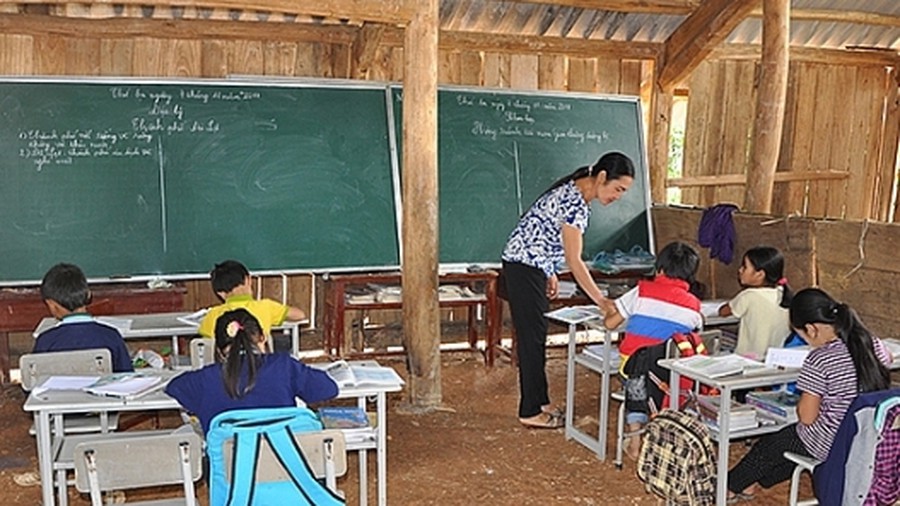Is it true that many teachers teaching in specially difficult regions will no longer receive allowances?
This is a question recently received quite a lot by Thu Ky Luat from our Clients and Members after Thu Ky Luat provided information regarding Decree 76/2019/ND-CP on policies for officials and public employees, workers, and salaried individuals in the armed forces working in areas with exceptionally difficult socio-economic conditions, which took effect on December 01, 2019.

Illustrative Image
So, what exactly is stipulated in Decree 76/2019/ND-CP? Does it mean that from the date this Decree takes effect, many teachers working in specially disadvantaged areas will no longer receive the allowances that Our Valued Customers, Members are concerned about?
Thu Ky Luat would like to clarify this matter as follows: The newly issued Decree 76 essentially does not reduce or supplement any allowances compared to the current regulations, but only consolidates all types of allowances for teachers and officials and public employees working in areas with exceptionally difficult socio-economic conditions into a single unified document. To be specific:, Decree 76 also clearly stipulates that teachers and officials and public employees working in these areas will be entitled to the following allowances: attraction allowance, long-term service allowance, initial grant, allowances for purchasing and transporting fresh and clean water, one-time allowance when transferring out of the specially disadvantaged areas or upon retirement, transportation fee reimbursement, allowances for visits, training, professional development, preferential allowances according to profession, mobility allowances, and allowances for teaching ethnic minority languages for teachers and educational management public employees. Therefore, those teachers and officials and public employees who are currently entitled to allowances under Decree 116 will continue to enjoy these allowances under Decree 76 when this Decree comes into effect.
Many people are concerned that they will no longer be eligible for the above allowances because of the changes in the regulations regarding the scope of areas with specially disadvantaged socio-economic conditions entitled to policies in Decree 76 compared to Decree 116. To be specific:, according to current regulations in Decree 116/2010/ND-CP, Decree 61/2006/ND-CP, Decree 19/2013/ND-CP, areas with specially disadvantaged socio-economic conditions include:
"a) Truong Sa, Hoang Sa, DK1 island districts;
b) Particularly difficult communes in ethnic minority and mountainous areas, particularly difficult communes in coastal and island areas as decided by the Prime Minister of the Government of Vietnam;
c) Particularly difficult hamlets, villages, sub-hamlets, hamlets, clusters, etc., (commonly referred to as hamlets) as decided by the competent authority."
However, Decree 76/2019/ND-CP, which officially comes into effect from December 1, 2019, has changed this regulation as follows:
“2. Areas with specially disadvantaged socio-economic conditions as stipulated in Clause 1 of this Article include:
a) Truong Sa, Hoang Sa, DK1 island districts;
b) Area III communes in ethnic minority and mountainous regions, particularly difficult island communes as decided by the Prime Minister of the Government of Vietnam;
c) Particularly difficult hamlets, villages, sub-hamlets, hamlets, clusters, etc., (commonly referred to as hamlets) as decided by the Prime Minister of the Government of Vietnam.”
Firstly, it can be seen that Decree 76/2019/ND-CP has changed the term “Particularly difficult communes in ethnic minority and mountainous areas” in Decree 116 to “Area III communes in ethnic minority and mountainous regions.” With this change in wording, many are concerned whether the state has narrowed the scope of particularly difficult communes in ethnic minority and mountainous areas eligible for policies or not. Are the Area III communes in ethnic minority and mountainous regions under the current regulations only a part of those defined in Decree 116? However, everyone should not be too worried because these terms essentially refer to the same subjects. To be specific:, according to Decision 50/2016/QD-TTg, communes in ethnic minority and mountainous regions are classified into three areas: Area III communes have exceptionally difficult socio-economic conditions; Area II communes have difficult but temporarily stabilized socio-economic conditions; and Area I communes are the remaining communes.
Thus, it can be seen that the Area III communes in ethnic minority and mountainous regions under Decree 76 are indeed the particularly difficult socio-economic communes in ethnic minority and mountainous areas as per Decree 116, without any change in the scope of application.
Regarding the list of Area III communes in ethnic minority and mountainous regions for the period 2016 – 2020, Valued Customers and Members can view HERE.
Secondly, Decree 76 changes the term “particularly difficult coastal and island communes as decided by the Prime Minister of the Government of Vietnam” in Decree 116 to “particularly difficult island communes as decided by the Prime Minister of the Government of Vietnam.” With this change in wording, many have been concerned whether the state has excluded particularly difficult coastal communes from the scope of areas with especially difficult socio-economic conditions eligible for policies. Regarding this issue, according to Decision 1559/QD-TTg, particularly difficult coastal and island communes are the communes located in coastal and island regions with borders contiguous with the coastline, or islet communes, peninsulas, lagoons, islands, and those meeting the criteria of this Decision. The list of particularly difficult coastal and island communes for 2016-2020, Valued Customers, and Members can view HERE.
However, regarding the new regulations in Decree 76, there has not yet been any specific Decision stipulating whether the particularly difficult island communes include particularly difficult coastal communes. Therefore, everyone should not be overly concerned and it cannot be affirmed that teachers and officials and public employees working in particularly difficult coastal communes will no longer receive the allowances under Decree 76. One should wait for specific guidance documents from the state.
Nguyen Trinh
- Guidelines for maintenance and renovation of villas in Ho Chi Minh City
- Guidelines for maintenance and renovation of villas in Ho Chi Minh City
- Resolution 190: Principles for addressing certain issues related to the organization and arrangement of state apparatus in Vietnam
- Guidance on identifying cases of inaccurate or non-operational electricity meters in Vietnam
- Official Telegram 16: Urgent requirement to allocate the entire state budget investment plan in 2025 in Vietnam
- Prime Minister of Vietnam directs to accelerate allocation and disbursement of public investment capital in 2025 in Vietnam
-

- Guidelines for maintenance and renovation of villas ...
- 14:30, 21/02/2025
-

- Guidelines for maintenance and renovation of villas ...
- 14:30, 21/02/2025
-

- Procedures for high school admission in Vietnam
- 14:25, 21/02/2025
-

- Resolution 190: Principles for addressing certain ...
- 11:30, 21/02/2025
-

- Guidance on identifying cases of inaccurate or ...
- 11:00, 21/02/2025
 Article table of contents
Article table of contents
